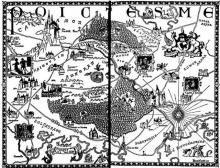- Home
- James Branch Cabell
Chivalry: Dizain des Reines Page 3
Chivalry: Dizain des Reines Read online
Page 3
Precautional
Imprimis, as concerns the authenticity of these tales perhaps the lessdebate may be the higher wisdom, if only because this Nicolas de Caen,by common report, was never a Gradgrindian. And in this volume inparticular, writing it (as Nicolas is supposed to have done) in 1470, asa dependant on the Duke of Burgundy, it were but human nature should he,in dealing with the putative descendants of Dom Manuel and Alianora ofProvence, be niggardly in his ascription of praiseworthy traits to anymember of the house of Lancaster or of Valois. Rather must one in commonreason accept old Nicolas as confessedly a partisan writer, who uponoccasion will recolor an event with such nuances as will be leastinconvenient to a Yorkist and Burgundian bias.
The reteller of these stories needs in addition to plead guilty ofhaving abridged the tales with a free hand. Item, these tales have beena trifle pulled about, most notably in "The Story of the Satraps," whereit seemed advantageous, on reflection, to put into Gloucester's mouth ahistory which in the original version was related _ab ovo_, and as asort of bungling prologue to the story proper.
Item, the re-teller of these stories desires hereby to tenderappropriate acknowledgment to Mr. R.E. Townsend for his assistance inmaking an English version of the lyrics included hereinafter; and toavoid discussion as to how freely, in these lyrics, Nicolas hasplagiarized from Raimbaut de Vaqueiras and other elder poets.[1]
And--"sixth and lastly"--should confession be made that in the presentrendering a purely arbitrary title has been assigned this little book;chiefly for commercial reasons, since the word "dizain" has beenadjudged both untranslatable and, in its pristine form, repellantly_outre_.
2
You are to give my titular makeshift, then, a wide interpretation; andare always to remember that in the bleak, florid age these talescommemorate this Chivalry was much the rarelier significant of anypersonal trait than of a world-wide code in consonance with which allestimable people lived and died. Its root was the assumption(uncontested then) that a gentleman will always serve his God, his honorand his lady without any reservation; nor did the many emanating by-lawsever deal with special cases as concerns this triple, fixed, andfundamental homage.

 Jurgen: A Comedy of Justice
Jurgen: A Comedy of Justice Chivalry
Chivalry Figures of Earth: A Comedy of Appearances
Figures of Earth: A Comedy of Appearances_preview.jpg) The Certain Hour (Dizain des Poëtes)
The Certain Hour (Dizain des Poëtes) Domnei: A Comedy of Woman-Worship
Domnei: A Comedy of Woman-Worship The Line of Love; Dizain des Mariages
The Line of Love; Dizain des Mariages The Line of Love. Dizain des Mariages
The Line of Love. Dizain des Mariages The Certain Hour. Dizain des Poëtes
The Certain Hour. Dizain des Poëtes The Jewel Merchants. A Comedy in One Act
The Jewel Merchants. A Comedy in One Act Gallantry. Dizain des Fetes Galantes
Gallantry. Dizain des Fetes Galantes The Cords of Vanity. A Comedy of Shirking
The Cords of Vanity. A Comedy of Shirking Domnei. A Comedy of Woman-Worship
Domnei. A Comedy of Woman-Worship Figures of Earth
Figures of Earth Jurgen. A Comedy of Justice
Jurgen. A Comedy of Justice Taboo. A Legend Retold from the Dirghic of Sævius Nicanor, with Prolegomena, Notes, and a Preliminary Memoir
Taboo. A Legend Retold from the Dirghic of Sævius Nicanor, with Prolegomena, Notes, and a Preliminary Memoir